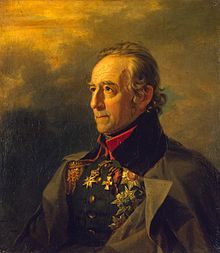You can help expand this article with text translated from the corresponding article in Russian. (May 2023) Click for important translation instructions.
|
| Jan Pieter van Suchtelen | |
|---|---|
 Jan Pieter van Suchtelen, Count of Liikkala. Jan Pieter van Suchtelen, Count of Liikkala. | |
| Born | (1751-08-02)2 August 1751 Grave, Netherlands |
| Died | 6 January 1836(1836-01-06) (aged 84) Stockholm |
| Nationality | Dutch |
Jan Pieter van Suchtelen, Count of Liikkala, Pyotr Kornilovich Suchtelen/Sukhtelen (2 August 1751, in Grave – 6 January 1836, in Stockholm), was born in the Netherlands, and was a general in the Russian army during the Russo-Swedish War (1808–1809). In 1812 Suchtelen was the plenipotentiary for Russian Emperor Alexander I in Örebro where he negotiated and signed the Treaty of Örebro which brought to an end the Anglo–Russian War (1807–1812). In that treaty his titles included "general of engineers, quarter-master general, member of the council of state".
He was active as military engineer. He established a preliminary project of the Modlin fortress, near Warsaw, when Russia captured this area after the third partition of Poland.
Since 1783 he actively worked in Russia. For his project of Staro-Kalinkin Bridge in St Petersburg he was promoted to the rank of colonel.
Created count, enrolled to the nobility of Finland where his main estate was located.
Charlotte Disbrowe visited Sweden in 1834, where her father, (Sir Edward Cromwell Disbrowe, a senior diplomat with the British Foreign Office) was stationed. She met Van Suchtelen and mentioned in her biography that:
Amongst the visitors I had forgotten to name General Suchtelen, the Russian Minister, who had been in Sweden from time immemorial, and was supposed to have come out of the ark. He was made very much of at that Court, indeed was allowed privileges not granted to other diplomatists, and my father had some difficulty in consequence of obtaining the proper position due to him as the accredited Minister of the Court of St. James. General Suchtelen had two brothers attached to his Legation as secretaries, of the name of Bodisko. They were known as Beau Disko and Laid Disko, for obvious reasons.
Notes
- Suchtelen name is translated into English in different ways:
- Peter de Suchtelen (Hansard, p. 180)
- Paul van Suchtelen (Frilund)
- Staff. Annual Bibliography... p. 278
- Frilund.
- Hansard. p. 180
- "Распоряжение №07-19-579/18" (PDF). КГИОП. 2018-12-10. Archived from the original (PDF) on 2021-08-30. Retrieved 2020-02-25.
- Osmo Durchman (1934), Varför blev Johan Peter van Suchtelen finsk friherre och greve? Genos 5
- Disbrowe pp. 188,189,208
References
- Disbrowe, Charlotte Anne Albinia. Old days in diplomacy: recollections of a closed century, Edition: 2, Jarrold, 1903, Chapter IV In Sweden.
- Frilund, Göran. The Union's Last War: The Russian-Swedish War of 1808-09, The Napoleon Series, Retrieved 2009-02-23. Cites Hornborg, Eirik. När riket sprängdes - fälttågen i Finland och Västerbotten 1808-1809, Holger Schildts förlag, Helsingfors; 1955.
- Hansard, Thomas Curson. The Parliamentary Debates from the Year 1803 to the Present Time Volume 24, Great Britain Parliament, and Hansard, 1813
- Staff. Annual Bibliography of the History of the Printed Book and Libraries: Volume 29 By Department Of Special Collections Of The Koninklijke Bibliotheek The Hague Staff ..., Edition: illustrated, Published by Springer, 2002, ISBN 1-4020-0237-8, ISBN 978-1-4020-0237-3
- Otto S. Lankhorst Jan Pieter van Suchtelen (1751-1836) verzamelaar van boeken en handschriften (in Dutch)
This article about a person from the Netherlands is a stub. You can help Misplaced Pages by expanding it. |
This biographical article related to the Russian military is a stub. You can help Misplaced Pages by expanding it. |